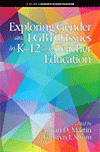
Exploring Gender and LGBTQ Issues in K-12 and Teacher Education
A Rainbow Assemblage
Edited by:
Adrian D. Martin, New Jersey City University
Kathryn J. Strom, California State University, East Bay
A volume in the series: Research in Queer Studies. Editor(s): Hidehiro Endo, Akita International University.
Published 2019
Past research on gender and LGBTQ issues in K-12 and teacher education has primarily focused on identifying ways of fostering inclusive and affirmative school communities for non-cis and/or queer students and enabling learning contexts to promote academic learning. Much of this work has attended to theorizing pedagogies and curricula conducive towards such an aim. Yet, despite legal advances for gender equity and LGBTQ rights in diverse global contexts and the increased visibility of LGBTQ issues in mainstream media, non-cis and queer individuals (especially those of color) continue to experience violence, face housing discrimination, employment discrimination, and the denial of service in public businesses.
In light of the numerous growing conservative movements to not only roll back legal advances for LGBTQ individuals, but to also promote a culture of homophobia and transphobia, scholars must attend to the myriad ways in which members of the school community can counter such efforts, and how the multiple facets of the educative experience can be conceptualized beyond a paradigm that continues to marginalize gender diverse and LGBTQ individuals. This volume, Exploring Gender and LGBTQ Issues in K12 and Teacher Education: A Rainbow Assemblage, edited by Adrian D. Martin and Kathryn J. Strom, provides examples of empirical inquiries and theorizations that explore how schools can function as more than safe academic environments for gender diverse and LGBTQ students. The contributing authors attend to classrooms and educative contexts as spaces that promote the affirmative inclusion of not only LGBTQ students, but other education stakeholders as well with the aim to dismantle homophobia, transphobia, misogyny, and other hate-based ideologies. The volume serves as an insightful and useful resource for educators, teacher educators, and education researchers engaged in inquiry and pedagogy towards systems of schooling unencumbered by heteronormativity other hate-based ideologies with implications for future professional practice.
CONTENTS
Foreword, Mara Sapon-Shevin. The Rainbow Assemblage: An Introduction, Adrian D. Martin and Kathryn J. Strom. SECTION I: EXPLORING GENDER IN K–12 AND TEACHER EDUCATION. Troubling Gender Ideology in Japan: Today’s University Students’ Views of Breadwinner and Homemaker Status, Paul Chamness Iida and Hidehiro Endo. The Hegemony of Transition and Transgender Counternarratives in Children’s Picture Books, Ashley Lauren Sullivan and Laurie Lynne Urraro. Pleasure Games (of Truth) in Boys’ Schooling: Interrogating Gender and Sexuality Through a Pleasure Lens, Göran Gerdin and Amanda Mooney. SECTION II: EXPLORING LGBTQ ISSUES IN K–12 SCHOOLS. Using Literacy to Explore Heteronormativity with Second-Graders, Paul Hartman. “I Want Them [Teachers] to Treat Us Like Human Beings”: Educational Experiences of Black Gay Youth, Michael D. Bartone. Beyond the Binary in Elementary School, Lynn Bravewomon. SECTION III: EXPLORING LGBTQ ISSUES IN TEACHER EDUCATION. Forging Alliances, Becoming-Ally: In Pursuit of Pedagogical Virtualities, Kathryn J. Strom. Battling Heteronormativity in Teacher Education: Reflections on a Human Development Course from a Teacher and Student, Peggy Shannon-Baker and Ingrid Wagner. An Intergenerational Self-Study of Narrative Reflections on Literature, Gender, and LGBTQ Identities, Adrian D. Martin and Monica Taylor. About the Editors. About the Contributors.
-
Paperback978-1-64113-617-4
Web price: $45.04 (Reg. 52.99)
-
Hardcover978-1-64113-618-1
Web price: $80.74 (Reg. 94.99)
- eBook978-1-64113-619-8

- SOC064000 - SOCIAL SCIENCE: LGBT STUDIES: General
- EDU037000 - EDUCATION: Research
- EDU053000 - EDUCATION: Training & Certification
-
 Negotiating Spiritual Violence in the Queer Community
Negotiating Spiritual Violence in the Queer Community
-
 Pólvora, sangre y sexo
dialogismos contemporáneos entre la literatura y el cine en América Latina
Pólvora, sangre y sexo
dialogismos contemporáneos entre la literatura y el cine en América Latina
-
 Queer Voices from the Locker Room
Queer Voices from the Locker Room
-
 Queering Classrooms
Personal Narratives and Educational Practices to Support LGBTQ Youth in Schools
Queering Classrooms
Personal Narratives and Educational Practices to Support LGBTQ Youth in Schools
-
 Queering Education in the Deep South
Queering Education in the Deep South
-
 Queering Public Health and Public Policy in the Deep South
Queering Public Health and Public Policy in the Deep South
-
 Queering Spirituality and Community in the Deep South
Queering Spirituality and Community in the Deep South

